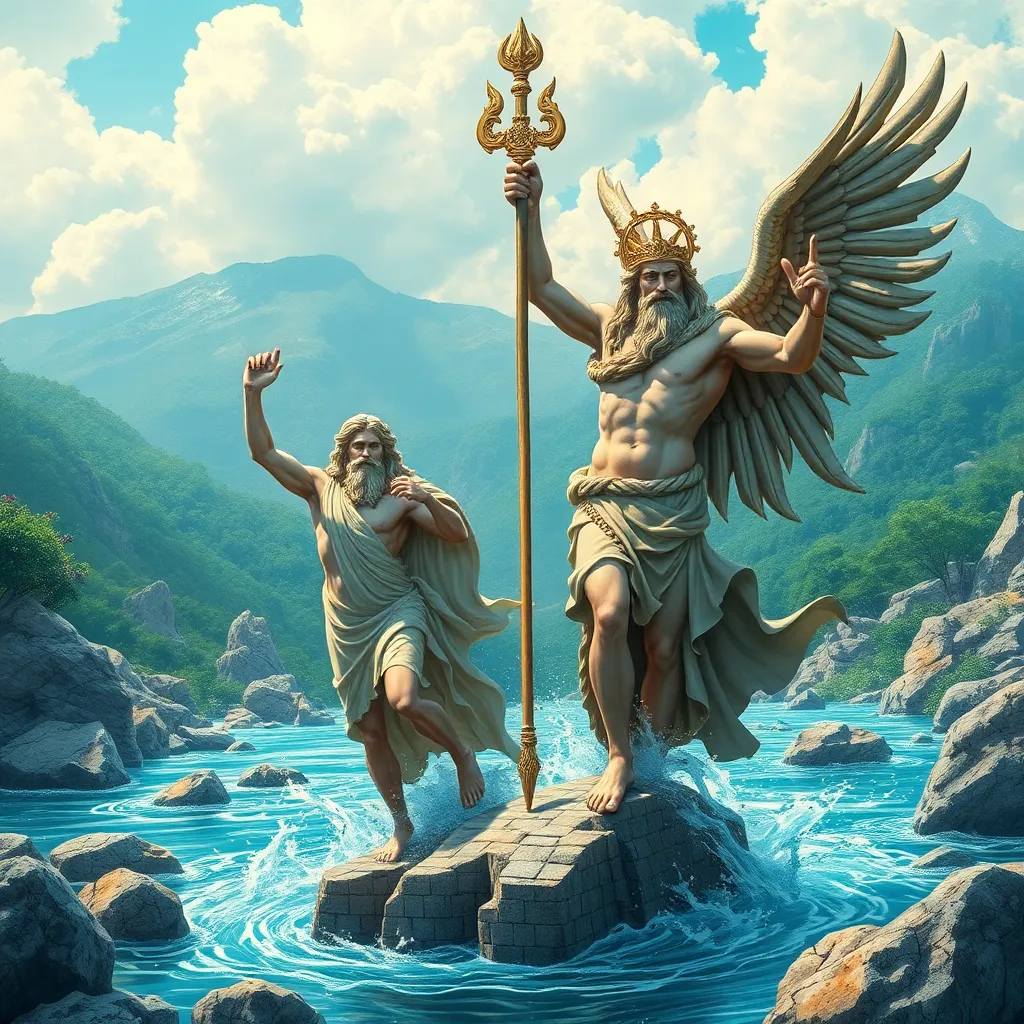The Myths of Apollo and the River God Peneus: Nature’s Forces
I. Introduction
Greek mythology is a rich tapestry of stories that have shaped the cultural and philosophical landscapes of the ancient world. It serves as a lens through which we can understand the forces of nature, the divine, and human existence. Within this pantheon, Apollo and Peneus stand out as powerful representations of natural forces—light and water, respectively. Their stories not only illuminate aspects of the natural world but also reflect the ancient Greeks’ reverence for the environment.
II. The Character of Apollo
Apollo, one of the principal deities of the Greek pantheon, is renowned for his multifaceted role as the god of light, music, and prophecy. He embodies the ideals of harmony, order, and beauty, serving as a beacon of enlightenment in the often chaotic world of Greek mythology.
As the god of light, Apollo symbolizes clarity and truth, illuminating the darkness of ignorance and chaos. His associations with music and the arts further enhance his image as a bringer of culture and civilization. Through his prophetic abilities, he connects the divine with humanity, offering guidance and foresight.
The symbolism of Apollo extends deeply into nature. The sun’s light, which he represents, is essential for life, fostering growth and sustaining ecosystems. This connection emphasizes the importance of harmony in nature, where every element plays a role in the balance of life.
III. The River God Peneus
Peneus, the river god, is another significant figure in Greek mythology. He is often depicted as a majestic figure, embodying the flowing nature of rivers. Peneus is associated with the Peneus River in Thessaly, which was known for its clear waters and vital role in the agricultural prosperity of the region.
The attributes of Peneus include wisdom, nurturing, and the life-giving aspects of water. In ancient Greek culture, rivers were not merely physical entities; they were considered sacred, often personified as deities that could influence the fortunes of cities and individuals. Rivers were seen as the veins of the earth, sustaining life and providing essential resources.
IV. The Relationship Between Apollo and Peneus
The interactions between Apollo and Peneus in various myths reveal a fascinating dynamic between light and water. One notable story involves Apollo’s pursuit of the nymph Daphne, who was the daughter of Peneus. In this myth, Peneus plays a protective role, transforming Daphne into a laurel tree to shield her from Apollo’s advances.
- This transformation illustrates the tension between desire and nature’s will, showcasing Peneus as a guardian of the natural order.
- Apollo’s relentless pursuit symbolizes the intensity of light and ambition, while Peneus’ intervention represents the fluidity and adaptability of water.
The thematic connection between Apollo’s radiant light and Peneus’ flowing waters reflects the balance of opposing forces in nature. Together, they demonstrate how light and water interact to create life, emphasizing the interconnectedness of different elements of the natural world.
V. Nature as a Force in Mythology
Apollo and Peneus embody the duality of nature’s forces, representing both creation and destruction. Apollo’s light can be seen as a force that nurtures growth, but it can also lead to drought and harsh conditions if it becomes too intense. Conversely, Peneus’ waters sustain life but can also be destructive during floods or storms.
This interplay of creation and destruction is a recurring theme in Greek mythology, highlighting the complexities of nature. Myths involving Apollo and Peneus often explore the consequences of human actions on the environment, serving as cautionary tales about the need to respect and understand the forces of nature.
VI. The Impact of Their Myths on Greek Culture
The myths of Apollo and Peneus have significantly influenced ancient art and literature. Apollo is frequently depicted in sculptures, paintings, and pottery, often shown with his lyre or as the sun god in a chariot. His imagery evokes themes of beauty, harmony, and divine inspiration.
Peneus, though less commonly represented, appears in various artistic interpretations, often symbolizing the life-sustaining aspects of rivers. Together, they have shaped Greek views on nature and the divine, illustrating the reverence with which the ancient Greeks approached both the physical world and the spiritual realm.
VII. Modern Interpretations of Apollo and Peneus
In contemporary society, the figures of Apollo and Peneus continue to resonate, albeit in new contexts. Apollo’s associations with light and enlightenment find relevance in discussions about knowledge, culture, and the arts. He serves as a symbol of the pursuit of truth and understanding in an increasingly complex world.
Peneus, on the other hand, can be viewed through the lens of environmentalism. As modern society grapples with the effects of climate change and water scarcity, the story of Peneus emphasizes the importance of preserving natural resources and respecting the delicate balance of ecosystems.
Both figures remind us of the necessity to maintain harmony with nature, urging contemporary audiences to reflect on their relationship with the environment.
VIII. Conclusion
The myths of Apollo and Peneus offer profound insights into the forces of nature and humanity’s place within it. Through their stories, we gain an understanding of the balance between light and water, creation and destruction, and the divine and the mortal. These narratives continue to hold significance in modern culture, reminding us of the enduring legacy of Greek mythology and its relevance to contemporary environmental discussions.
As we explore the tales of Apollo and Peneus, we reflect on the importance of respecting nature’s forces and the lessons that can be drawn from these ancient myths. Their stories are not just relics of the past; they are vital narratives that continue to inform our understanding of the world around us.




